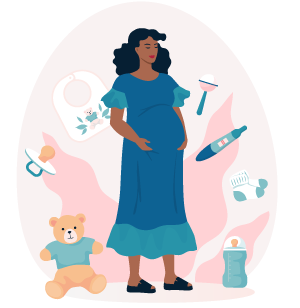
About High-Risk Pregnancy
A high-risk pregnancy is one that carries an increased chance of complications for the mother, baby, or both. These complications can arise from pre-existing medical conditions, pregnancy-related factors, or a combination of both.
Risk Factors of High-Risk Pregnancy
Several factors can contribute to a high-risk pregnancy, including:
- Maternal health conditions: Chronic conditions like diabetes, high blood pressure, autoimmune diseases, or previous pregnancy complications can increase risks.
- Age: Being very young (under 17) or older (over 35) during pregnancy can be a risk factor.
- Multiple pregnancy: Carrying twins, triplets, or more babies increases the risk of complications.
- Fetal concerns: Birth defects, chromosomal abnormalities, or poor fetal growth can elevate risk.
- Lifestyle factors: Smoking, drug use, or untreated infections can negatively impact pregnancy health.


High-Risk Pregnancy Signs
While some high-risk factors might not have noticeable symptoms, some potential signs to be aware of include:
- Vaginal bleeding or cramping
- Severe or persistent abdominal pain
- Sudden or excessive swelling
- Changes in vision or headaches
- Decreased fetal movement
- Urinary tract infections (UTIs)
It’s important to remember that experiencing some of these symptoms doesn’t necessarily mean you have a high-risk pregnancy, but it’s crucial to consult your doctor for evaluation.
Benefits of Seeing a High-Risk Pregnancy Specialist
A high-risk pregnancy specialist, also known as a maternal-fetal medicine (MFM) specialist, has additional training and expertise in managing complex pregnancies. They can offer several benefits:
- Personalized care plan: Develop a comprehensive plan to optimize your health and your baby’s development.
- Advanced monitoring: Utilize specialized tests and monitoring techniques to closely track your health and the baby’s wellbeing.
- Collaboration with other specialists: Work with other healthcare professionals as needed to manage any pre-existing medical conditions.
- Reduced risk of complications: Early identification and proactive management of potential issues can help reduce the risk of complications.
- Improved pregnancy outcomes: Proper care from an MFM specialist can lead to a healthier pregnancy and delivery.
Studies suggest that with proper management and advanced reproductive techniques like IVF, pregnancy success rates for women with PCOS can be comparable to those without PCOS.


Additional Costs Associated with a High-Risk Pregnancy
High-risk pregnancies often involve additional medical care, which can translate to higher costs. Here are some potential cost factors:
- More frequent doctor visits and prenatal tests
- Hospitalization for monitoring or treatment
- Specialized medications or procedures
- Fetal monitoring equipment
Open communication with your doctor and understanding your insurance coverage is key to managing the financial aspects of a high-risk pregnancy.
FAQs
2. How can I prepare for a high-risk pregnancy?
To prepare for a high-risk pregnancy, consult your healthcare provider regularly, follow prescribed treatments, maintain a healthy diet, manage stress, avoid harmful substances, stay active with approved exercises, and educate yourself about your specific risks and necessary precautions.
3. Can I still have a healthy baby with a high-risk pregnancy?
Absolutely! Early identification of a high-risk pregnancy allows for proactive management, significantly increasing the chances of a healthy baby. Following your doctor's recommendations and receiving specialized care from an MFM specialist are crucial.
4. What are the additional steps for a high-risk pregnancy?
Closer monitoring and care: More frequent checkups, specialized tests, medication management, and potential hospitalization might be needed.
5. Does insurance cover High-risk Pregnancy treatment?
Insurance coverage varies, but many plans cover prenatal care, tests, and some complications. Check your provider for details.
